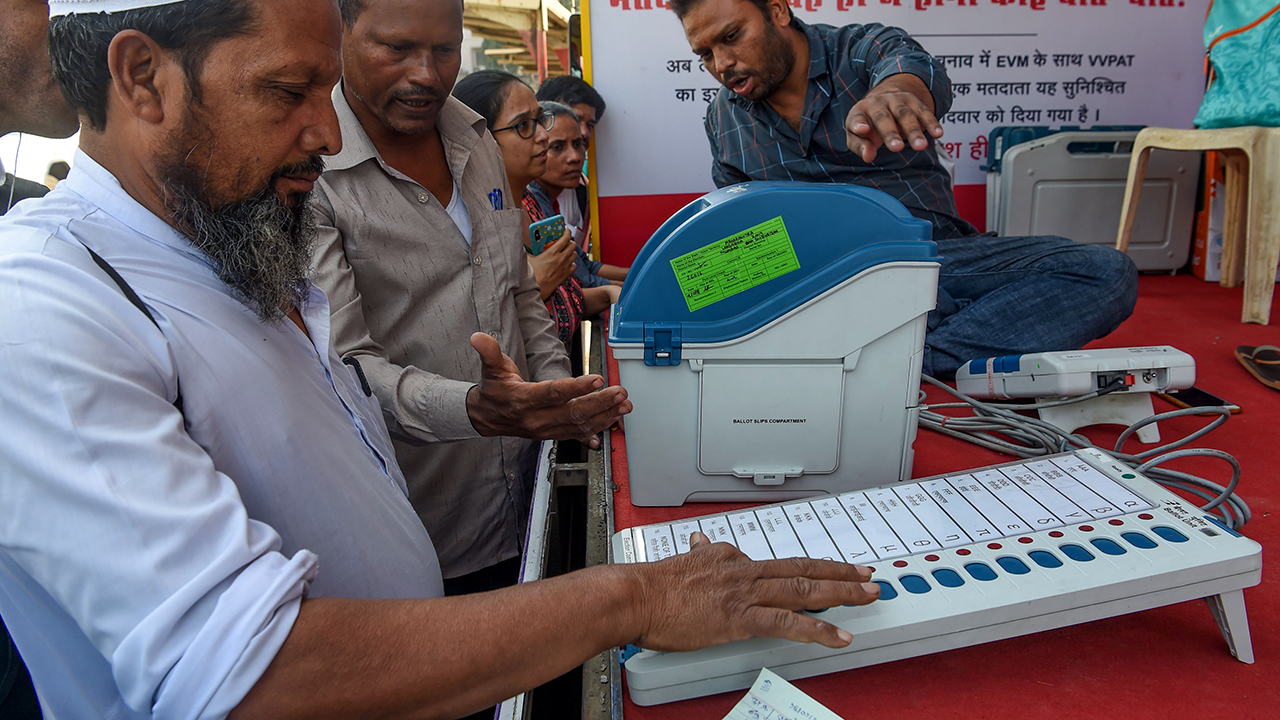 Indians try out electronic voting machines in Mumbai in January, ahead of the country’s upcoming general elections. (Indranil Mukherjee/AFP/Getty Images)
Indians try out electronic voting machines in Mumbai in January, ahead of the country’s upcoming general elections. (Indranil Mukherjee/AFP/Getty Images) As many as 900 million people are expected to vote in India’s national elections in April and May. The elections come amid a recent increase in tensions between India and Pakistan, as well as allegations that mobile applications including WhatsApp, Facebook and Twitter are fueling the spread of fake news in the world’s largest democracy.
Two surveys conducted by Pew Research Center in 2018 shed light on how adults in India see their elected officials and their democracy – as well as how they feel about the spread of misinformation via mobile technology. Here are five key findings from the surveys as Indians prepare to cast ballots:
1
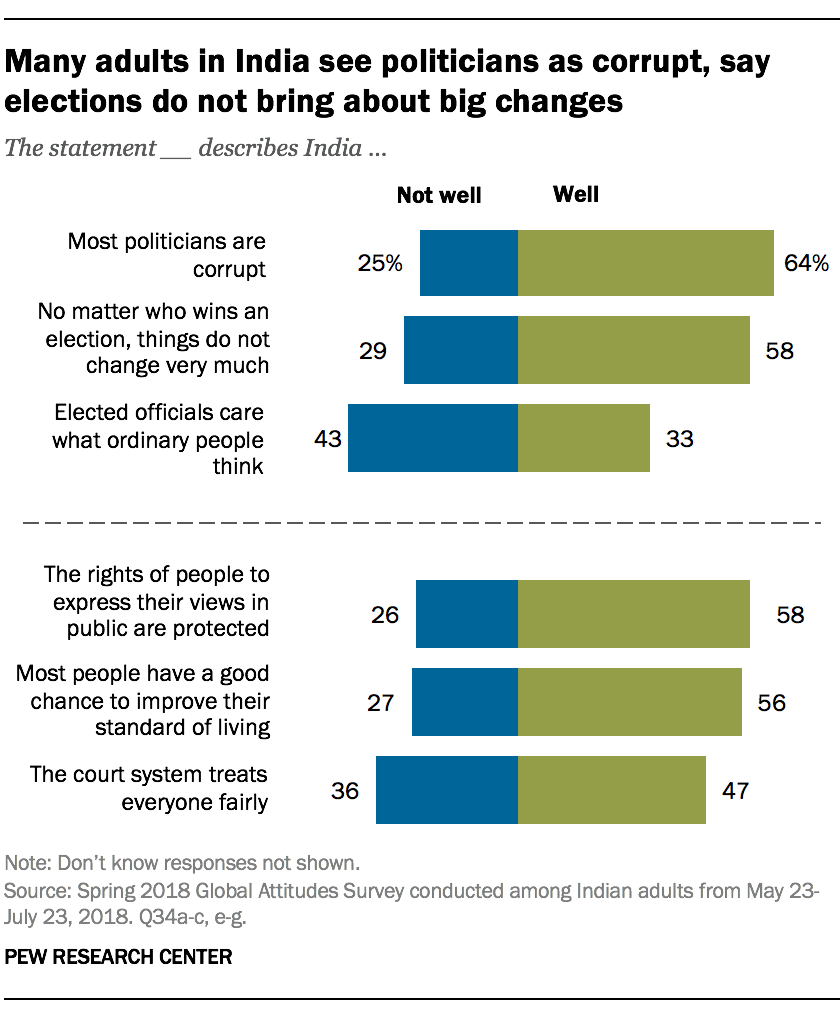 Most Indian adults see politicians as corrupt and question whether elections are effective. About two-thirds (64%) say most politicians are corrupt, including 43% who very intensely hold this view, according to a spring 2018 survey by the Center. Notably, nearly seven-in-ten supporters of the two major parties contesting the election – Prime Minister Narendra Modi’s Bharatiya Janata Party (BJP) and the opposition Indian National Congress party – share the view that most elected leaders are corrupt (69% in each party say this). On a related question, only a third of Indians think elected officials care about the opinions of ordinary people in their country.
Most Indian adults see politicians as corrupt and question whether elections are effective. About two-thirds (64%) say most politicians are corrupt, including 43% who very intensely hold this view, according to a spring 2018 survey by the Center. Notably, nearly seven-in-ten supporters of the two major parties contesting the election – Prime Minister Narendra Modi’s Bharatiya Janata Party (BJP) and the opposition Indian National Congress party – share the view that most elected leaders are corrupt (69% in each party say this). On a related question, only a third of Indians think elected officials care about the opinions of ordinary people in their country. Meanwhile, 58% of adults in India say that no matter who wins an election, things do not change very much. This again includes a majority of both BJP and Congress supporters.
Despite these negative views, Indians think their country allows other democratic values to flourish. By more than two-to-one, for example, Indians say the rights of people to express their own views are protected and that most people have a good chance to improve their standard of living. A sizable share (47%) also believes the courts treat everyone fairly.
2
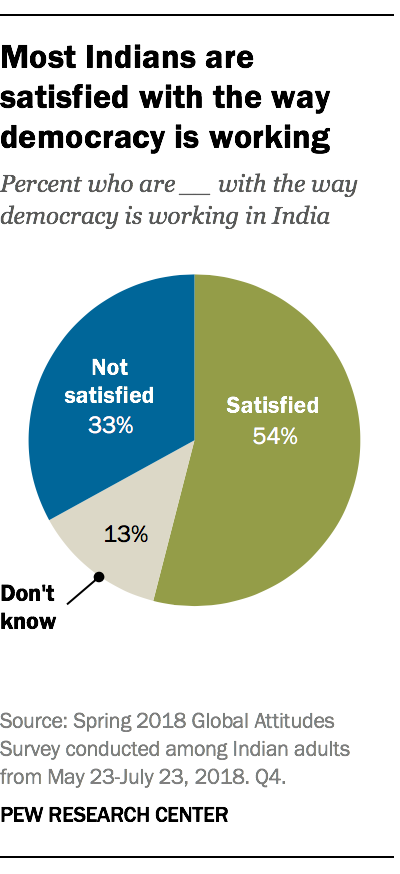 A little over half of Indian adults (54%) are satisfied with the way democracy is working in their country, but a third are dissatisfied. Men are more likely than women to give Indian democracy a thumbs-up, though one-in-five women decline to offer an opinion. Satisfaction with the state of India’s democracy also differs by party affiliation: Three-quarters of BJP supporters are satisfied, compared with only 42% of Congress adherents.
A little over half of Indian adults (54%) are satisfied with the way democracy is working in their country, but a third are dissatisfied. Men are more likely than women to give Indian democracy a thumbs-up, though one-in-five women decline to offer an opinion. Satisfaction with the state of India’s democracy also differs by party affiliation: Three-quarters of BJP supporters are satisfied, compared with only 42% of Congress adherents. 3Indians largely view Pakistan as a threat and believe the situation in Kashmir warrants more military force. The recent escalation in tensions between India and Pakistan after the Pulwama attack has turned the long-running territorial dispute over Kashmir into a potent campaign issue for Modi. In the Center’s spring survey last year, 76% of Indians said Pakistan is a major threat to their country, including 63% who said it is a very serious threat. This view was shared by people in rural areas and urban centers, supporters of both the prime minister’s BJP and the Congress party, as well as Indians across age groups. Additionally, 65% said terrorism is a very big problem in India.
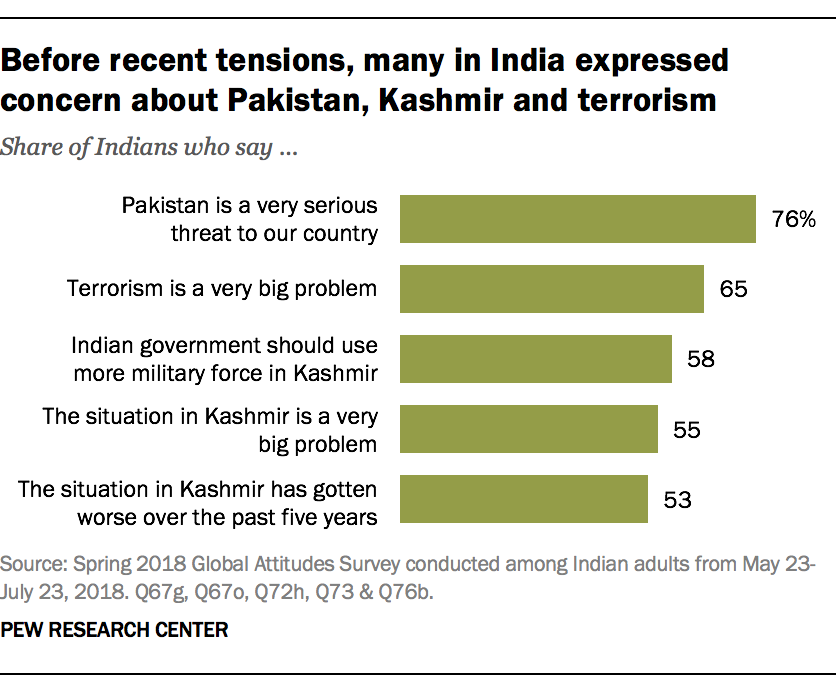
When asked specifically about Kashmir, a majority of Indians (55%) see the situation there as a very big problem. More than half (53%) say circumstances in Kashmir have gotten worse over the last five years, and a majority (58%) believes the Indian government should use more military force than it uses currently in dealing with tensions in the area.
In the aftermath of the violence in Pulwama, Indian social media platforms saw such an uptick in fictitious or purposely misleading stories related to the attack that the head of Facebook India’s Integrity Initiatives tweeted that he had “never seen anything like this before.”
4
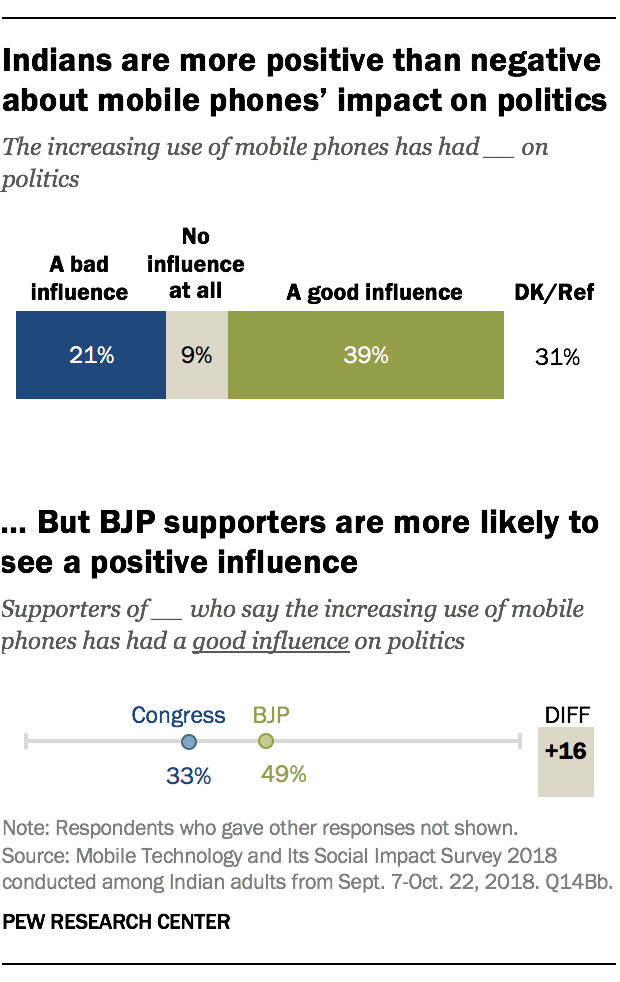 Many Indians are using mobile phones to get news, but the public is divided over how these devices have influenced politics. About eight-in-ten Indian adults say they own or share a mobile phone, and most of these users (81%) say their phone has helped them obtain information and news about important issues, according to a separate 2018 survey. However, Indians have mixed attitudes about mobile phones’ overall impact on politics. About four-in-ten say the increasing use of mobile phones has had a good influence on politics. Indians feel similarly about the impact of the internet on politics: Again, about four-in-ten say it has had a good influence. However, only a minority of Indians (38%) currently go online.
Many Indians are using mobile phones to get news, but the public is divided over how these devices have influenced politics. About eight-in-ten Indian adults say they own or share a mobile phone, and most of these users (81%) say their phone has helped them obtain information and news about important issues, according to a separate 2018 survey. However, Indians have mixed attitudes about mobile phones’ overall impact on politics. About four-in-ten say the increasing use of mobile phones has had a good influence on politics. Indians feel similarly about the impact of the internet on politics: Again, about four-in-ten say it has had a good influence. However, only a minority of Indians (38%) currently go online. Partisanship plays a role in public opinion of the impact of mobile technology. Adults who support Modi’s BJP are more likely to say mobile phones have had a good influence on politics (49%) than those who support the Congress party (33%). Last September, the president of the BJP encouraged the party’s supporters to spread pro-BJP messages on WhatsApp and other social media platforms – whether those messages are “true or fake.”
5
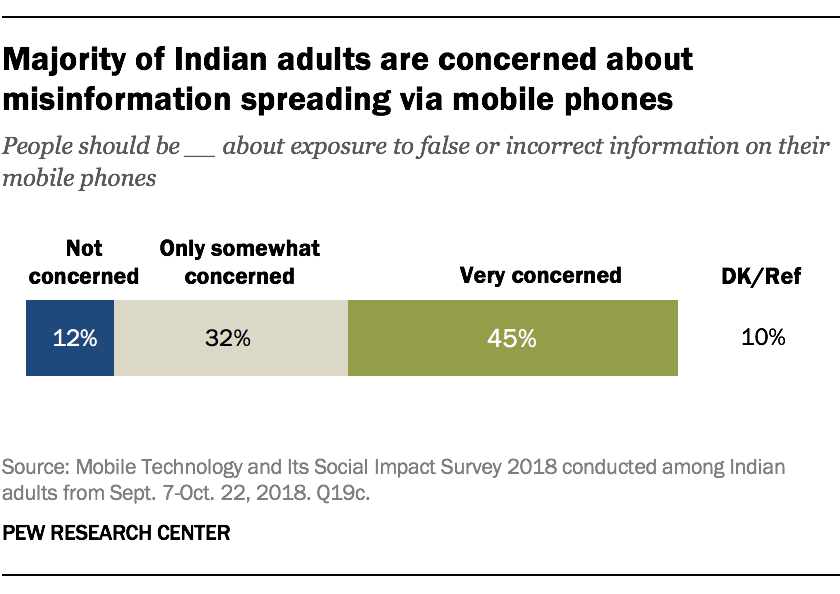 Roughly three-in-four Indians (77%) say they are very or somewhat concerned about people being exposed to false or incorrect information when they use their mobile phones, including 45% who are very concerned. Similar shares of both BJP and Congress supporters say they are very concerned. This finding comes amid recent violent attacks attributed to viral WhatsApp hoaxes and concerns about the app being used to spread fake news.
Roughly three-in-four Indians (77%) say they are very or somewhat concerned about people being exposed to false or incorrect information when they use their mobile phones, including 45% who are very concerned. Similar shares of both BJP and Congress supporters say they are very concerned. This finding comes amid recent violent attacks attributed to viral WhatsApp hoaxes and concerns about the app being used to spread fake news. Of the seven social media and messaging apps included in the survey, WhatsApp and Facebook are the most widely used in India – although relatively modest shares of Indian adults (29% and 24%, respectively) report currently using them. While this means a majority of Indians do not use these apps, the 1.35 billion-person country still has the largest number of WhatsApp and Facebook users in the world. In the lead-up to this spring’s election, some mobile apps are taking steps to curb the spread of misinformation. WhatsApp, for example, says it is using artificial intelligence to help spot fabricated news; the company says these efforts have led it to suspend more than 6 million user accounts over the past three months.
